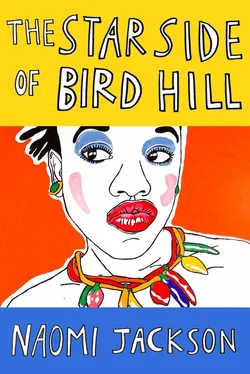Dionne knew that a cup of milky black tea could calm her mother. And so she’d brewed countless cups until the box of PG Tips was empty and there was no money to buy more.
“Just like him,” Avril kept saying. And then, “You remember Jean?” she’d ask Dionne. At first, Dionne would shake her head. But Avril insisted that Jean had held her when she was a baby, that he’d come to visit and she’d laughed and played patty-cake with him until Jean’s arms were tired. Eventually Dionne went along, repeating stories Avril had told her about Jean, because it made her mother smile, and Dionne had learned that some things were worth the price of dishonesty.
Once Avril was home for good, anything that was out of its designated place would be lost to Avril’s packing fervor. And it was for this reason that Dionne pared down her clothes to just a few items. She hid them beneath her bed because she knew Avril wouldn’t trouble them there — three pairs of jeans and five tops, a few dresses, two pairs of shorts, two bras, and seven panties. The danger was not in loving something too much, Dionne thought, but in loving anything more than what you could carry in your pocket or on your back. Dionne had learned to make the objects of her affection small — designer jeans, a certain kind of pencil whose eraser released a scent when you used it, a new lipstick.
Loving another person, she knew well from watching and knowing Avril, was the most dangerous thing of all. Loving a country besides the one you lived in was a recipe for heartache.
For Dionne, Barbados was at best an inconvenience. As far as she was concerned, being born in Barbados had never benefited her in any particular way. She did know that Barbados was the one thing that her crazy mother and absent father had in common. Which is to say that for Dionne, Barbados was at the root of what she thought was wrong with her family, and not anywhere she wanted to spend an extended period of time.
Dionne once had another idea entirely about how she would celebrate her sixteenth birthday. She and her best friend in Brooklyn, Taneisha, had their hearts set on a party hall on Church Avenue. Everybody was going to be there: Taneisha’s Trinidadian cousins and uncles and sisters, their friends from school (mostly Taneisha’s), and Darren, the boy who Dionne had been going with since he’d moved up from Jamaica three years before.
Dionne was drawn into the school yard romance with Darren by girls who said “it would be cute if y’all went together” because of the way that Dionne’s chestnut skin played off Darren’s hazelnut eyes, the same eyes that had every girl from Vandeveer to Erasmus fantasizing about Darren looking at them. As Dionne got to know Darren on their bus rides home together, her affection for him had deepened, fulfilling the vain promise that had brought them together. Since she’d arrived in Barbados, Dionne thought of Darren often in spite of herself, though she knew that attachment was the first step on the road to disappointment.
After her father left, Dionne witnessed a parade of men her mother entertained for as long as they would stick around. But while she could attract men, draw them into her web, Avril had trouble keeping them. In the last relationship, the one that ended the year before Dionne started high school, Dionne wanted to believe her mother’s conviction that her boyfriend, Musa, would marry her. But something happened once her mother made her intentions for Musa clear, and every time he came over after that, he was always just about to leave again, as if her mother’s desire for him had propelled him in the opposite direction. By his last visit, Musa wouldn’t even take his coat off, just brought the books he’d promised to Phaedra and the Vogue fall fashion issue he’d promised to Dionne, kissed their mother, and left. Dionne had learned from her mother that if you wanted to keep a man, he should love you at least a little bit more than you loved him.
Avril’s plan to send the girls back home for the summer, announced just one week before they left, had messed up everything — the party, working at V.I.M. to save up money for school clothes, Dionne’s hopes of going into the city on Saturday nights with Darren and Taneisha and her girls. So, here she was in Bird Hill on her birthday, Saturday, July 16. And as her grandmother Hyacinth would say, nothing at all go so. There would be no DJ making special shout-outs to the birthday girl, no adults hovering in the back alley smoking joints, drinking beer, squeezing past each other to heap their plates high with curry chicken and roti skins. No girls dancing front to front on boys, winding their waists as if their whole lives had made them move this way, talking afterward about the boys whose dicks had gone hard, then soft on them.
Back in Brooklyn, the outfit that Dionne put on layaway — white jeans with a question mark in gold thread on the back pockets, a matching white top and jacket — still had $20 to go before it was paid off. Instead of wearing it, Dionne was sporting the new dress her grandmother made for her with “room to grow,” a maritime number with a boat collar, white trim, and heavy navy fabric. Dionne thought that the dress was more fit for a box of powdered milk than a girl like her, with legs that started just below her neck, arms made for hanging on to boys rather than pounding nutmeg, and hands more fit for finger-snapping than housework of any kind.
Buller Man Jean was the one to whom most of the hill women turned to get their clothes sewn and, in a pinch, their hair done. He owed Dionne’s grandmother a favor and so he gave Dionne a relaxer before the party that left her hair not quite straight. A night of sleeping in hard plastic rollers had given Dionne a neck ache and tight curls that didn’t brush her shoulders the way she liked. But it would have to do. A lifetime of watching her mother closely had been nothing if not a tutorial in resignation and making do.
Now Dionne looked around for Jean. She searched first for the elastic hair bands he wore like bracelets around his wrist, and then for his skin that was the color of a ripe plum. She wanted to catch Jean’s eye so that she could register her disdain about her hair with him, but she couldn’t find him in the crowd. She took note of the fact that she had never seen Jean at church or a church function, which in Bird Hill was a way of saying she had never seen him out. The church, more than being just a place to worship the Lord, was the place where the fabric of the community was woven, public dramas played out and put to rest, subtle lines of hierarchy drawn and redrawn again. If the hill were a quilt made up of its families, Jean and his mother Trixie’s patch was one the quilter forgot beneath her bed.
The party, if it was fair to call it that, was a joint one with Clotel Gumbs, a girl who wore glasses with lenses as thick as breadfruit skin, crinoline dresses that reached her ankles, and a mouth that seemed to open only to correct grammar or to quote Bible verses. Dionne thought Clotel rather unfortunate. And though in summers past the girls played together and ran as far as the hill women saw fit to let them, now it was clear that they had nothing in common besides a birthday. Where Clotel envisioned a life as a schoolteacher and homemaker, Dionne saw herself working in a fashion house on Fifth Avenue, selecting trends for the next fall collection. In Dionne’s mind, her summer job selling sneakers and clothes at V.I.M. on Flatbush was a humble but legitimate step toward her career in fashion. Being stuck in Barbados, a place she might have described as sartorially challenged, was another step a world away from the life of glamour Dionne wanted for herself, a life full of style and free of the burdens of her mother’s and sister’s needs. These differences, simply matters of style when Dionne and Clotel were younger, were now big enough to constitute a wall neither of them could see over.
Читать дальше












